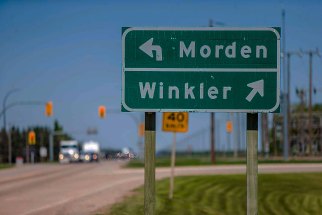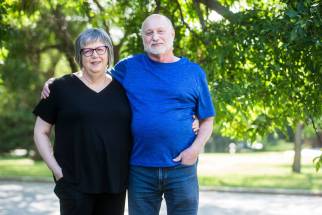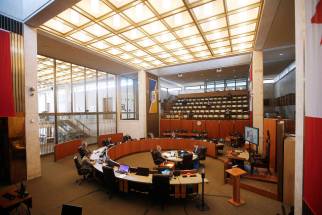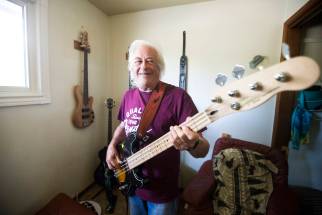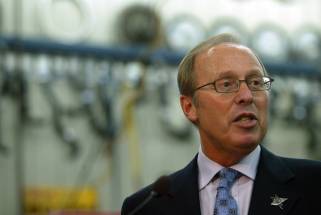Life after restrictions Six months after public-health orders dropped, quiet has largely returned to southern Manitoba — but anger lingers
Read this article for free:
or
Already have an account? Log in here »
To continue reading, please subscribe:
Monthly Digital Subscription
$0 for the first 4 weeks*
- Enjoy unlimited reading on winnipegfreepress.com
- Read the E-Edition, our digital replica newspaper
- Access News Break, our award-winning app
- Play interactive puzzles
*No charge for 4 weeks then price increases to the regular rate of $19.00 plus GST every four weeks. Offer available to new and qualified returning subscribers only. Cancel any time.
Monthly Digital Subscription
$4.75/week*
- Enjoy unlimited reading on winnipegfreepress.com
- Read the E-Edition, our digital replica newspaper
- Access News Break, our award-winning app
- Play interactive puzzles
*Billed as $19 plus GST every four weeks. Cancel any time.
To continue reading, please subscribe:
Add Free Press access to your Brandon Sun subscription for only an additional
$1 for the first 4 weeks*
*Your next subscription payment will increase by $1.00 and you will be charged $16.99 plus GST for four weeks. After four weeks, your payment will increase to $23.99 plus GST every four weeks.
Read unlimited articles for free today:
or
Already have an account? Log in here »
Hey there, time traveller!
This article was published 12/08/2022 (1214 days ago), so information in it may no longer be current.
When the mayor of Morden thinks back on leading the southern Manitoba city during and post-pandemic, he knows full well it’s come at an immense personal cost.
Brandon Burley was one of the first — and loudest — pro-COVID-19 vaccine, pro-mask, pro-restrictions leaders in the area, which saw low vaccination uptake rates and pushback against public health orders.
Nearly six months after Manitoba dropped its COVID restrictions, life is different for Burley. He’s lost at least a dozen friends — they chose to end the friendship, he says, because their beliefs didn’t align with his. But losing a few friends hasn’t been the worst of it.
RUTH BONNEVILLE / WINNIPEG FREE PRESS FILES Morden mayor Brandon Burley is suffering long-term symptoms of COVID and said he and his children have been personally threatened by anti-maskers in the area.
“The specific acute example is some of those people giving up my home address to people who were making threats and thinking that was a justified reaction to their grief around the vaccine,” Burley, 40, said this week. “Those kinds of betrayals.”
He has no regrets, though. He is seeking another term as mayor and said he’s been able to create new connections in the midst of his advocacy. While the dust has settled around public health rules, the fight hasn’t ended.
“There will be a part of this, I think that will be charged for a very long time.
“And even though restrictions are going away, that anger that’s boiled up is now turning to other things… I think what we discovered is that sometimes being angry feels useful, and feels like it makes you relevant, and I think that it will take some time for some portion of the population to settle into a rhythm of not having to be politically charged.”
In the Southern Health region, 69.5 per cent of residents have had their first vaccine dose, 66.7 per cent have their second and 34.1 per cent have their third. The region’s uptake remains the lowest in the province.
Winkler Mayor Martin Harder supported dropping restrictions six months ago, saying the city couldn’t afford the financial impact of keeping them any longer. He said he hasn’t seen a shift in the sentiments from his 14,000 constituents.
“I don’t think we’ve changed anybody’s mind,” said Harder, 73. “Those who were anti-vaxxers are still anti-vax, people who were anti-mask are still anti-mask, people that were pro and for whatever, they’re still vehemently voicing their opinions.”
MIKE DEAL / WINNIPEG FREE PRESS FILES Winkler mayor Martin Harder at Winkler City Hall.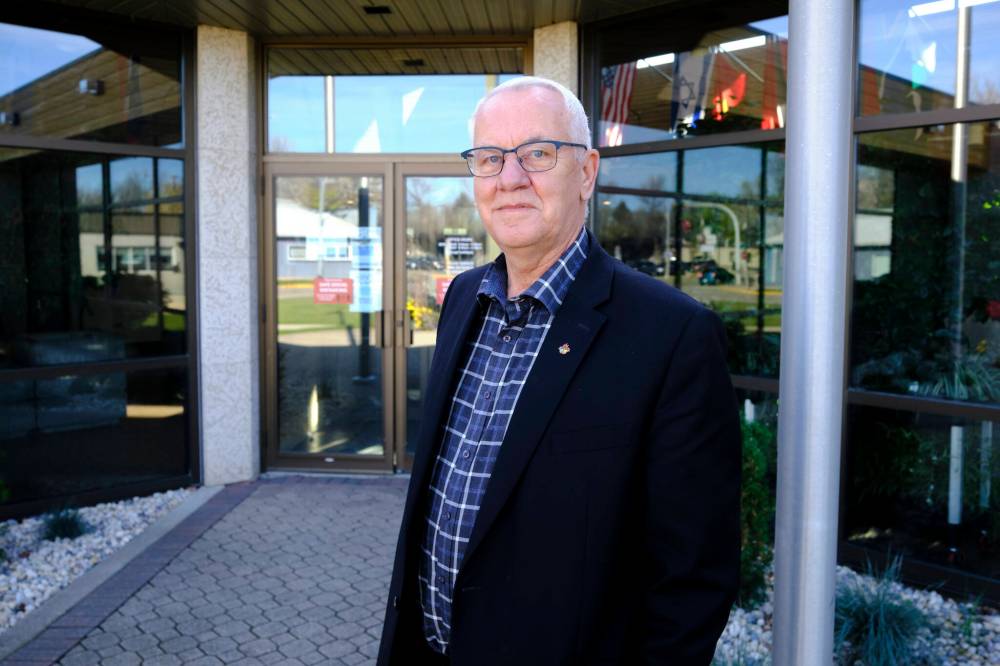
Some of those opinions have come in new packages. Convoys of truckers who have largely moved on from criticizing COVID-19 restrictions still roll through, but with new targets — anger at the federal government and support for international protests that align with their ideals. A recent protest that began in Headingley promoted solidarity with farmers in the Netherlands, currently in a standoff with government over the country’s new nitrogen policies.
Seeing upside-down or defaced Canadian flags on vehicles is particularly painful for Harder, who said many of those who pass through aren’t from Winkler.
“Whenever I see a truck driving, and this isn’t just a personal experience, I’ve talked to some other people who have a similar experience — you know how sometimes you get that gut-wrenching feeling within? It’s just like your stomach just gives you a shot? Every time I see one of those, I say, ‘Wow, this is just wrong.’”
Harder’s name won’t be on the ballot when Manitobans vote in October’s municipal elections. He believes Winkler largely supported his middle-ground approach to the pandemic, and those who didn’t had no impact on his decision. He hopes if there comes a time when COVID-19, monkeypox or future health crises results in renewed discussions around mandates, that the province be more consistent on messaging.
“I think if they take a look at the restrictions, if there are any coming, they better look at them very carefully not to make the same mistakes they did the last time. Because otherwise, it’ll blow up,” he said.
Harder has thrown his support behind the sole registered candidate in Winkler’s mayoral race, deputy mayor Henry Siemens. Siemens found himself in the middle of the divide a year ago when the sign rental company he operates, Magnetsigns, was asked to create signage displaying opinions on both sides of the COVID debate.
MALAK ABAS / WINNIPEG FREE PRESS FILES At the intersection of Highway 3 and Road 25W in the rural municipality of Stanley, on the way from Morden into Winkler, a sign critical of the COVID-19 vaccine sits on land owned by Stanley councilor Alfred “Bitz” Loewen.
On at least one occasion, the company took down a sign after hearing concerns from the public — an advertisement for controversial horse dewormer ivermectin as a suitable treatment for COVID-19. Siemens was criticized for that sign, and others, regardless of whether they had been created by his company.
Those days appear to be over — Siemens hasn’t received a request to produce a COVID-19-related sign this year. He’s optimistic about how Winkler has moved on post-restrictions, noting the city’s entrepreneurial spirit has allowed the economy to rebound.
“I think the divisiveness that was there, by and large, is largely backed away, people are working hard to rebuild relationships,” said Siemens, 54.
Siemens is vaccinated and encourages constituents with concerns to speak with their doctor. He hopes should anyone else throw their hat into the race, they keep the conversations focused on issues under the municipality’s umbrella.
Megan Franklin grew up in Winkler. Watching communities in her home continue to splinter months after pandemic restrictions were lifted has been difficult for the business owner.
“It is so frustrating,” said Franklin, 27. “As long as that continues to be a very visible part of our community, there will be a divide, because not everybody agrees with that, and not everybody agrees that our Canadian flag should have been taken and co-opted into something that is just not right.”
SUPPLIED Megan Franklin owns Frank + Olive, a wellness studio in Winkler.
Franklin opened Winkler-based wellness studio Frank + Olive in March 2020 — a tough time to open a business as it was. It got tougher when Franklin decided to continue mandating masks after the province lifted restrictions both briefly in August 2021 and again in March 2022. At the time, she dealt with hateful phone calls and messages. She said the support she’s received has far outweighed the negative.
“I’ve had to have some conversations with other local business owners and just say as much as you might fear standing up for the right thing, or placing your voice behind this issue, the negative responses don’t necessarily come from people within the community. And even though there are a few of them, and they are loud, overall, I have continued to be supported and pushed forward by the people around me,” she said.
Franklin decided to make masks optional in June, but staff continue to wear them — as do many of the clients. Business has been good, and she finds herself surrounded with people who share her values. It’s part of what motivates her to stay.
“I have watched a lot of great people from Winkler and surrounding communities leave and move away to different provinces or different cities because of the climate in Winkler, and something that I’ve kind of told myself throughout watching all of that is that if we all leave because we’re not happy with the way things are going here, who is going to change those things so that people in the future aren’t dealing with the same issues?”
malak.abas@freepress.mb.ca

Our newsroom depends on a growing audience of readers to power our journalism. If you are not a paid reader, please consider becoming a subscriber.
Our newsroom depends on its audience of readers to power our journalism. Thank you for your support.


